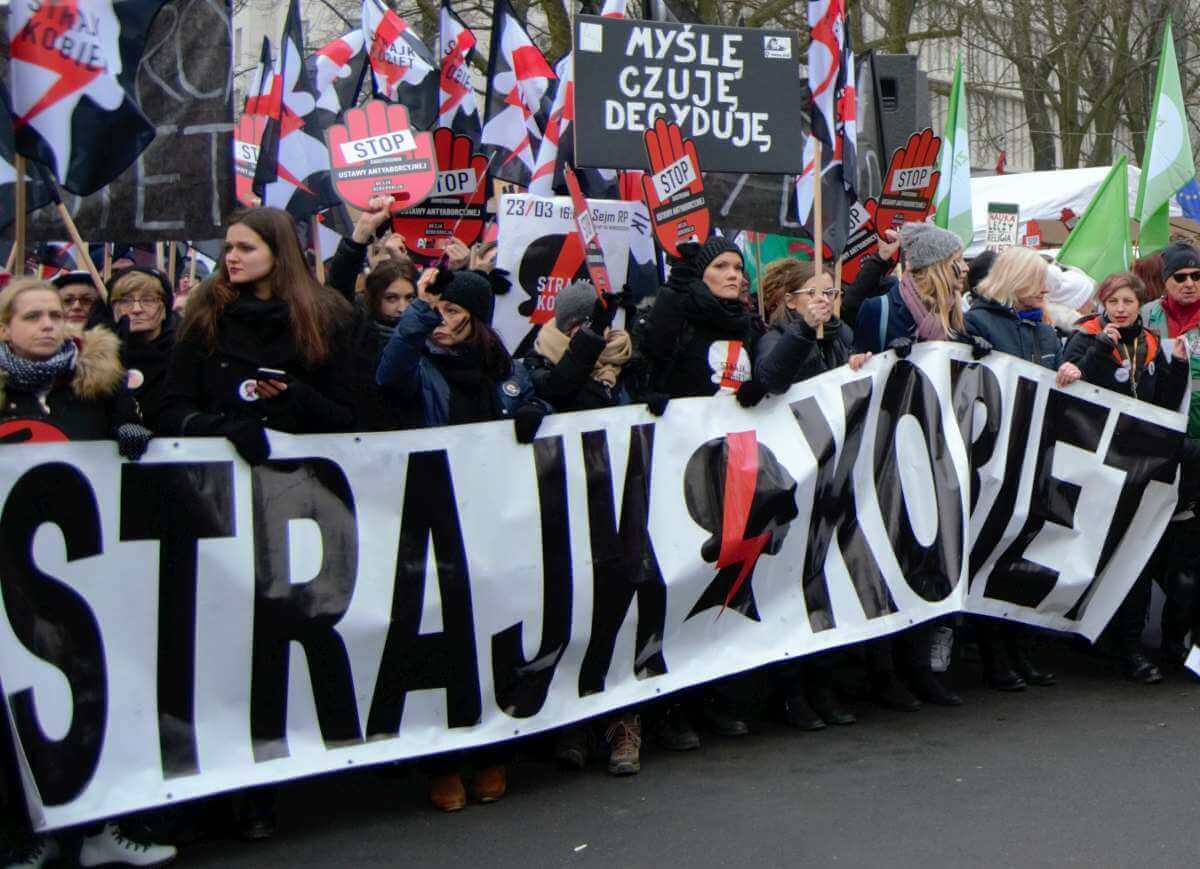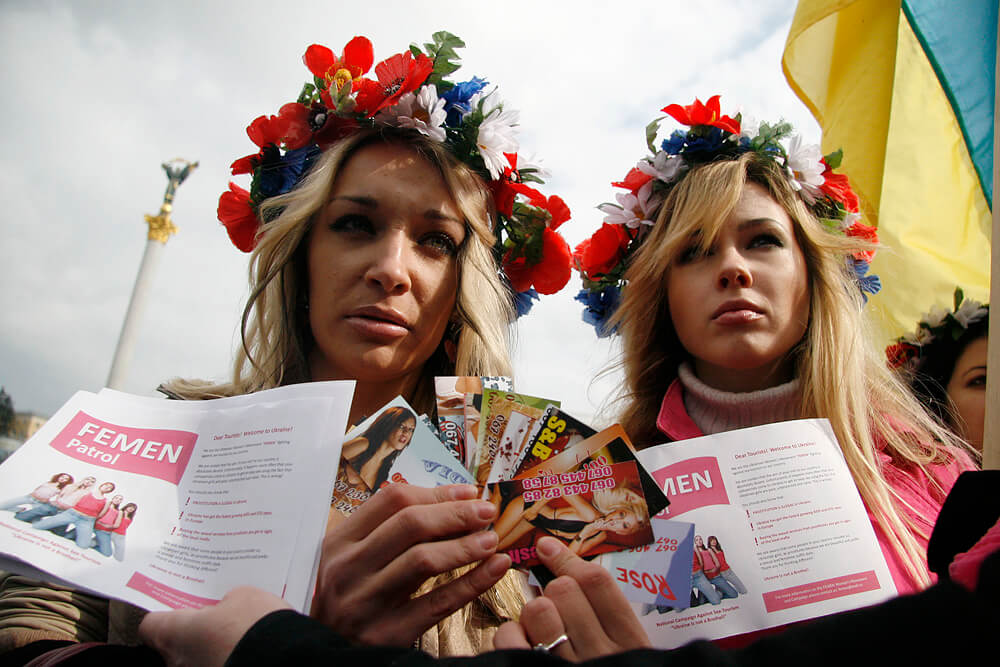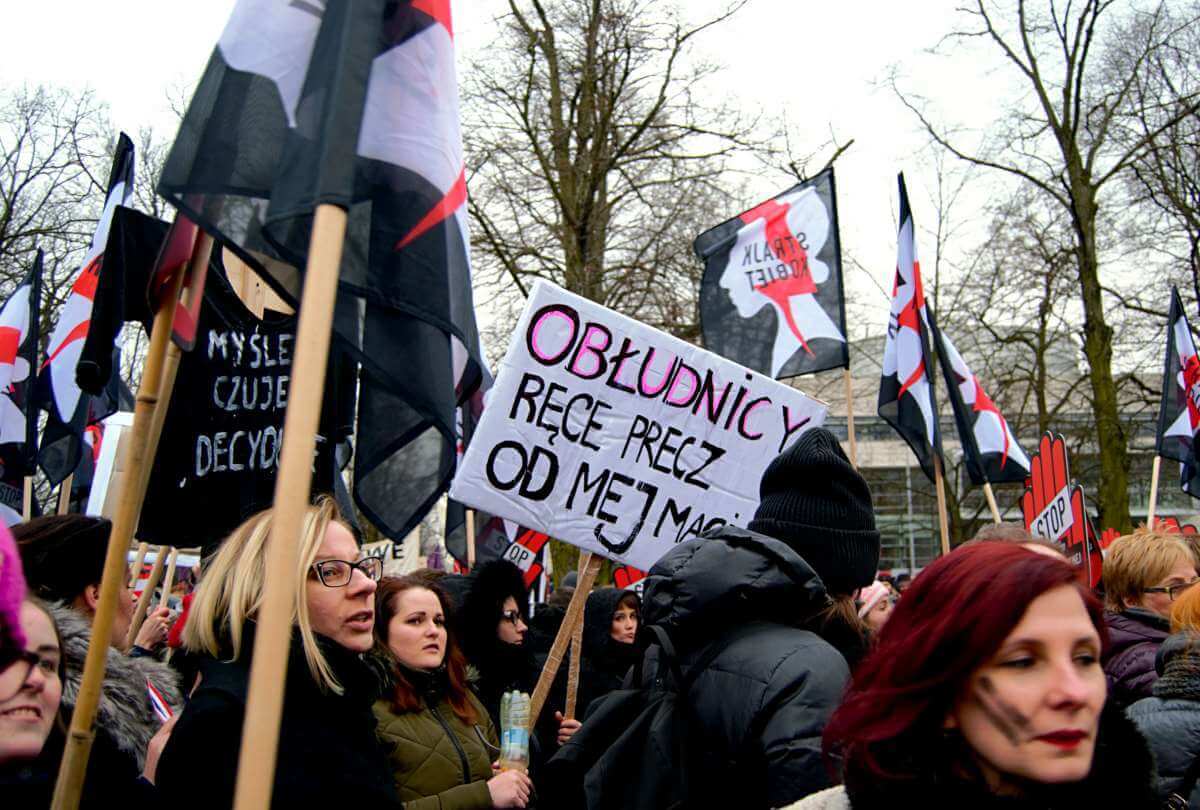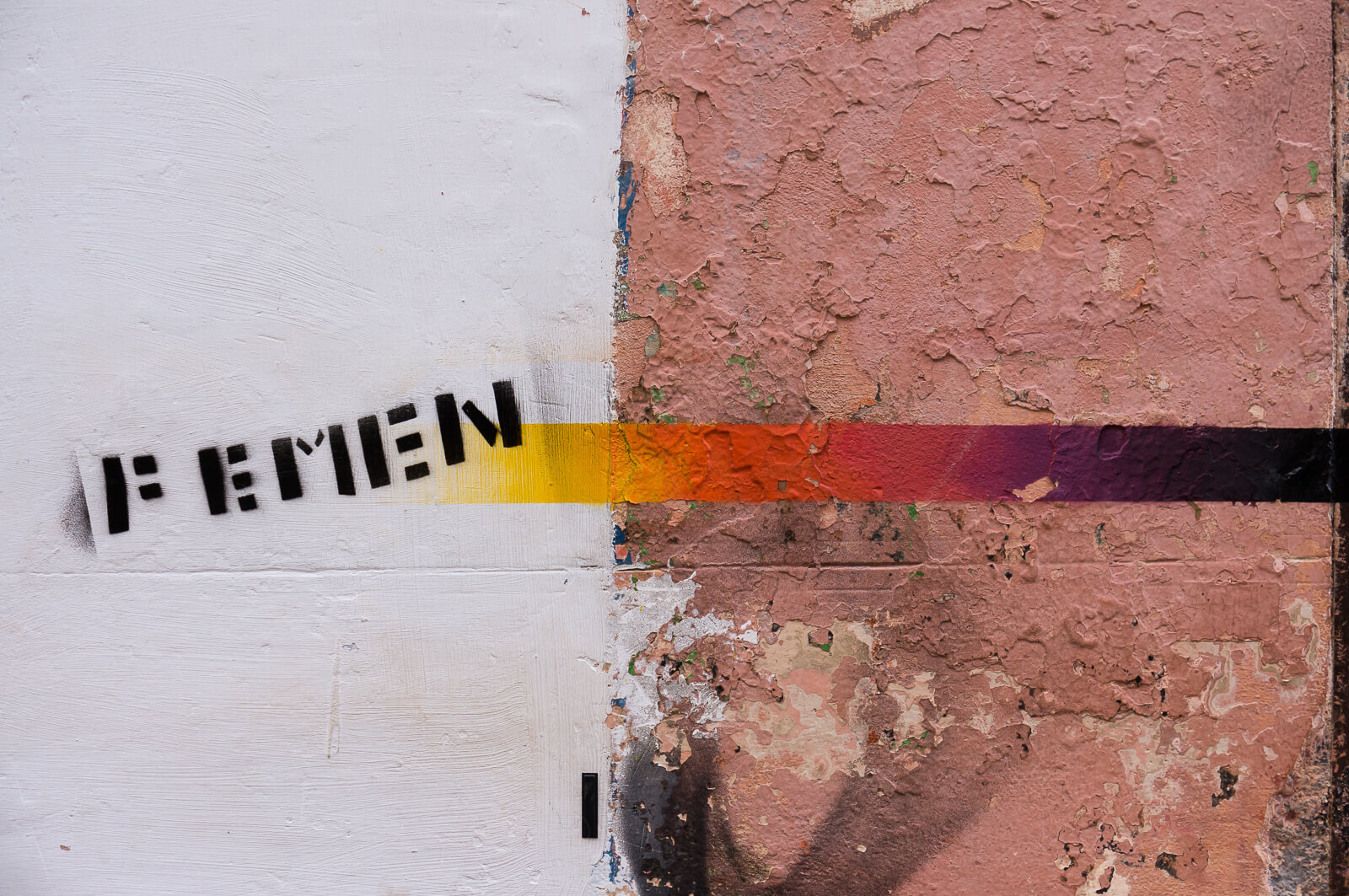*The following is an edited transcript of an interview conducted for European Alternatives’ forthcoming documentary, Demos: Solidarity in Europe.
While activists, unions and political parties are looking for strategies to build alliances to contest the rise of far right and xenophobia across the globe, the feminist movement has proved in the past decade that there are ways to cooperate, act and mobilise in solidarity for different purposes. We had a conversation with Elżbieta Korolczuk, representative of the Czarny protests in Poland, and Inna Shevchenko, from Femen, about the intersections of the different feminist mobilisations that are taking place today.
European Alternatives: We wanted to start with an overview of what you are doing in your movements, perhaps starting from Poland. In the past months we’ve seen images of the far-right fascist demonstration, but we’ve also seen images of extraordinarily empowering feminist demonstrations that have been an inspiration for the rest of Europe. Can tell us something about how the Black Protests started? How come Poland has these two very opposite faces?
Elżbieta Korolczuk: I think it’s partially a polarisation of the political scene, where you have these very strong emotions, where you have changes in almost every area of social and political life, and that makes some people feel that this is the right moment to go out into the streets and, let’s say, openly support fascist views. But at the same time there is also a strong opposition towards these kinds of ideas. As for women, for quite a long time we were told that the situation would get better, that we were getting there, you know, we would become civilised and more gender equal. But then last year there was a moment when we felt “no, this is not going to happen”. What was actually taking place was an attack on women’s rights, on women’s political rights, but also on their bodies.
European Alternatives: The law criminalising abortion…
Elżbieta Korolczuk: Yes, because in Poland abortion is banned, it is basically illegal except for three situations, which are very rare. That, however, was an open declaration that they are not going to stop, that the Church and the right wing forces want total control over women’s bodies. And this is part of their political agenda. So this, together with the fact that other demonstrations were already taking place, other protests, made it more “normal” to go out into the streets. Indeed other channels of communication between people and citizens, between citizens and the power have been closed, so we have been on the streets because that is the only place where we can really say we are not going to accept this situation. This became a strong incentive for many women from big cities, from small cities, from villages, to really say “we are not going to accept this”. And it has become a really huge movement, because there has been all this emotion, at a specific political moment, and so much work on the part of feminist women’s organisations behind that. I would say that in Poland we have the strongest feminist movement in the Region.

European Alternatives: Of course, the private is political, but the public space sometimes is even more so. And Ukraine, one of the countries of origin of Femen, is in a certain sense another country that has an extraordinarily strong nationalist far-right sentiment at times, but it is also the place where you launched the initiative that now is spreading throughout the continent and beyond with Femen. So maybe you can tell us a little bit about the brewing ground of this movement taking place today.
Inna Shevchenko: The movement was born in post-Soviet Ukraine, and I think this is a very key word to describe the context in which the movement was born. In fact, it was born at a time when Ukraine was still struggling over which course to take: pro-Russian, or pro-European, meaning pro-Western-European, because Ukrainians very rarely associate themselves to Europe, you know? And I think we very often think about Europe as 28, soon 27 EU States; or should we consider all 47 States of the Council of Europe? So as Ukrainians, we never felt like being in between. We had to make a choice, go with Russia or with the EU. This was during the decade following the collapse of the Soviet Union. There were political forces pushing for a pro-Russian course for Ukraine, which of course necessarily links the political Ukrainian system to the Russian one, already visibly a sort of dictatorial regime, and very deeply rooted in sexism, misogyny, heavily influenced by the Church. These are some examples of the reasoning behind this emerging movement. The trigger, however, was the outburst of sexual exploitation of women, the sex industry, sex tourism, that was actually, and is still today, what I call a social disease in Ukraine, from which millions of women suffer. And that was the main point from which Femen was born as a movement, as a reaction to horrifying exploitation of women as a tool for male enrichment via the sex industry, as a tool for male pleasure, a tool, a body, that was objectified and could serve only one mission: the sexual mission. And that was our reaction. We started fighting the sex industry in 2008, and in 2010 there was this big political change in Ukraine, with the election of the dictator Janukovyč – we would later find out that his was a dictatorial regime –, and that was the time that we understood, as women, that we are deprived of a voice in these public debates, in the debates about all social, political and economic issues, that there are no female voice, no female opinions, no female questions. So we said: “Well, if nobody is speaking for us, we will be speaking for ourselves”. And what we started doing was to react to various manifestations of male dominance with our voice, women’s voice and, moreover, with women’s bodies, because this body was always a tool of male institutions, of the male industry, always serving male patriarchal interests. We decided to claim it back, transforming it into a political poster, and to make our bodies serve our female interests. It will be sexual when I decide it is sexual, and it will be political when I decide it is political.

European Alternatives: Something that also unites both movements is their transnational dimension, on the one hand you have movements that have been clearly moving beyond Ukraine, beyond Poland, as a consequence of the protest and the activities that you organise, but you also have a movement coming to Poland and Ukraine from the rest of the world in the form of solidarity actions. In this sense we wanted to ask you how you feel and navigate this realm of transnational solidarity, this two-way road of cooperation beyond Poland and beyond Ukraine. And of course, Femen is global, and the national movements that are now springing up, also in support of the Polish protests in Warsaw, are for everybody to see, all around Europe. How do you see this path of transnational solidarity?
Elżbieta Korolczuk: I think that we are trying to revive a radical solidarity ideal, which is not necessarily embedded in institutions, such as the ones in the European Union, or in other institutions, indeed it is rather a grassroots movement. It is very much based on a connection of women from different groups, from different parts of the world, who actually have a lot in common in terms of the situations they face, the kind of discrimination they have to endure, the kind of invisible work they have to perform, the lack of voice. And I think it’s really important to see how these ideas travel, because the Polish national strike, for instance, has been influenced by the idea behind the women’s strike in Iceland in the ‘70s, and that was the idea we connected to the Polish tradition of strikes at the time of Solidarity, but also before, when, in the ‘80s women in impoverished cities such as Łódź were taking to the streets with children to demand bread. This is the kind of tradition that we wanted to connect to, and then it turned out that it could spread throughout the world and in every country. In South Korea, the United States, Argentina, Chile, Mexico and other countries, for example, movements had a national dimension but also a transnational dimension. In one country it would be femicide, that would be the most important issue – the problem of violence against women is something that pops out almost everywhere –, but I would say that the sense of solidarity is something that connects us all: the fact that if women get together, they can achieve really great things. They can bring about change, political change. Of course the left, the progressive, liberal, centre is very divided, but this is something we can work on, this is a dialogue that we can start and continue in different contexts, in different languages and using different symbols, it is still our fight, our common fight.

Inna Shevchenko: Right, I think it is important to see the international dimension, the fact that the feminist movement became so international, also in our case, or at least in the case of these two movements. When Femen went international for us personally it was a big surprise, we didn’t aim to build an international movement. For us it was a personal and local fight, as we were addressing our personal problems as Ukrainian women in Ukraine. Then we saw that women from Spain, from France, from Brazil, from Tunisia, from Turkey were writing to us and saying “I have different issues in my country, but your tactic speaks to me because my body is also victimised, objectified. As a woman I’m not safe in this society, I also want to join. I want to have Femen in Turkey, I want to have Femen in Spain”. So this was a form of approval, it was proof that women’s rights are a global issue, because there is a global attack on women’s rights, it is a global world-wide attack on women and that is why the fight of women becomes global, a worldwide defence of common goals, common aims, with all the diversity – which is beautiful indeed – and differences. We are very different, and sometimes we have very different goals, but we are also united by one idea, united by one aim, and this is something we share. So with regard to solidarity and the transnational movements we are seeing today, I think we have proof that there are so many issues that we share as human beings, that we have more things in common than differences between us. What we share is actually more, and the question of solidarity and united fights, transnational fights and transnational politics, makes much more sense when we think of ourselves as equal human beings, when we think about the fundamental human rights we all want – the same rights, not rights for women in the Middle East different from those for women in America. No, we are equal human beings in different parts of the world and we share so much that having a transnational fight makes much more sense.
European Alternatives: Yes, we have globalised our economy and the effects are for all to see, but we never managed to globalise our politics, or globalise our democracies, and perhaps women’s struggles are actually showing us one way in which this is possible.

![Political Critique [DISCONTINUED]](http://politicalcritique.org/wp-content/uploads/2015/09/Political-Critique-LOGO.png)
![Political Critique [DISCONTINUED]](http://politicalcritique.org/wp-content/uploads/2015/09/Political-Critique-LOGO-2.png)
Comments here are censored. If you don’t agree with the PC Western agenda, you get deleted. But what more would we expect, considering the topic at hand.
I’m from the U.S. and have been living in Ukraine for over a year, learning Russian. If you thought Ukraine was bad now, wait until you see what it’s like when this force from the west and the Islamic force from the south do. Patriarchy is natural and right. And no, I’m not a sex tourist. Too busy learning Russian and working on my little projects. It saddens me that I feel the need to leave the West. Would have loved to live in Berlin, but just no.